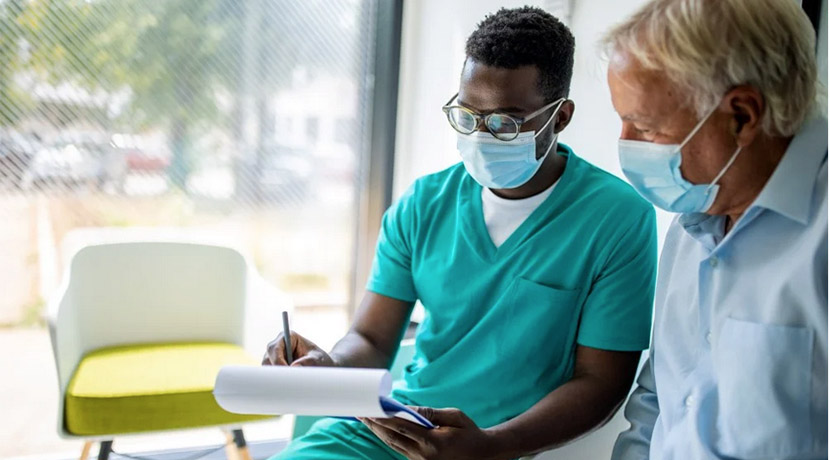
As a Licensed Practical Nurse (LPN) you can feel good about what you are doing — helping others. You can also enjoy being in a profession where there is a need for more people as well as flexibie schedules. The path to becoming an LPN is relatively short and you will have the option to continue on to become an RN if you choose to. You will find students of all ages in this program.
BMCC offers a certificate program to become a Licensed Practical Nurse (LPN) to fulfill an immediate need in the healthcare workforce and it will also serve as a pathway to other medical careers. The program has 46 credits with 16 credits of general education prerequisite courses and 30 credits of LPN courses. The competitive GPA of the five prerequisite courses (i.e., BIO 111, HED 110, ENG 101, MAT 104, and PSY 100) and the competitive score on an admission test (e.g., HESI A2) would determine admission.
The program will provide you with the knowledge, practical skills and experience to become a valuable professional, contributing to quality healthcare. Students progress through the program by passing all nursing courses with 73% (C) or better. Upon completion of the program, students will be eligible to take the National Council of Licensure Exams for Practical Nursing (NCLEX-PN).
Learn more about Admission to the Practical Nursing Certificate Program.
Image courtesy of the American Nurses Association
Requirements
Practical Nursing Certificate Program Maps
General Education Courses
- Introduction to the structure and function of the human body with emphasis on both the physiological mechanisms in health and disease, as well as concepts and current issues in human biology. Topics include: the molecules of life, cells, tissues, and organ system homeostasis; the skeleton, muscles, the heart, blood, skin, the sensory mechanisms of the eye, ear, taste, touch, and perception; nervous, endocrine, respiratory systems, the brain, genetics, and immune system, infectious diseases, cancer and nutrition.
Course Syllabus - English Composition is the standard freshman writing course. The course introduces students to academic writing. By its conclusion, students will be ready for English 201 and for the writing they will be asked to do in advanced courses across the curriculum. Students completing ENG 101 will have mastered the fundamentals of college-level reading and writing, including developing a thesis-driven response to the writing of others and following the basic conventions of citation and documentation. They will have practiced what Mike Rose calls the "habits of mind" necessary for success in college and in the larger world: summarizing, classifying, comparing, contrasting, and analyzing. Students will be introduced to basic research methods and MLA documentation and complete a research project. Students are required to take a departmental final exam that requires the composition of a 500 word, thesis-driven essay in conversation with two designated texts.
Prerequisite: Pass the CAT-R and CAT-W or Accuplacer tests
Course Syllabus - This course in health educations offers a comprehensive approach that provides students with the knowledge, skills, and behavioral models to enhance their physical, emotional, social, intellectual and spiritual health as well as facilitate their health decision-making ability. Areas of specialization include: alcohol, tobacco and abused substances, mental and emotional health, human sexuality and family living, nutrition, physical fitness, cardiovascular health, environmental health and health care delivery. HED 110 fulfills all degree requirements for HE 100. Students who have completed HED 100 - Health Education will not receive credit for this course.
- This course covers computations and measurements essential in the health science professional fields with an emphasis on nursing. Topics include units and systems of measurement, reconstitution of powdered medications, oral and parenteral dosage calculations, adult and pediatric dosage calculations based on body weight, intravenous calculations, and pediatric medication calculations. Students who passed MAT 104.5 cannot take MAT 104 course. Students who passed MAT 104 course cannot take MAT 104.5 course.
Prerequisites: MAT 12, MAT 14, MAT 41, MAT 51 or MAT 161.5
Course Syllabus - The course introduces students to the scientific study of behavior and mental processes. Students will learn about current perspectives, historical roots and scientific methods in psychology. Topics within major areas of psychology may include biopsychology, human development, learning, cognition, social processes, personality and psychological disorders.
LPN Certificate Courses
Semester One
Semester Two
Semester Three
Footnotes
- Students who have successfully completed BIO 425 within 5 years of admission to the program can use that course as a substitute for the BIO 111 requirement.
- ENG 100.5 will also satisfy this requirement.
- MAT 104 must be taken at BMCC. MAT 104.5 will satisfy the requirements of MAT 104.

